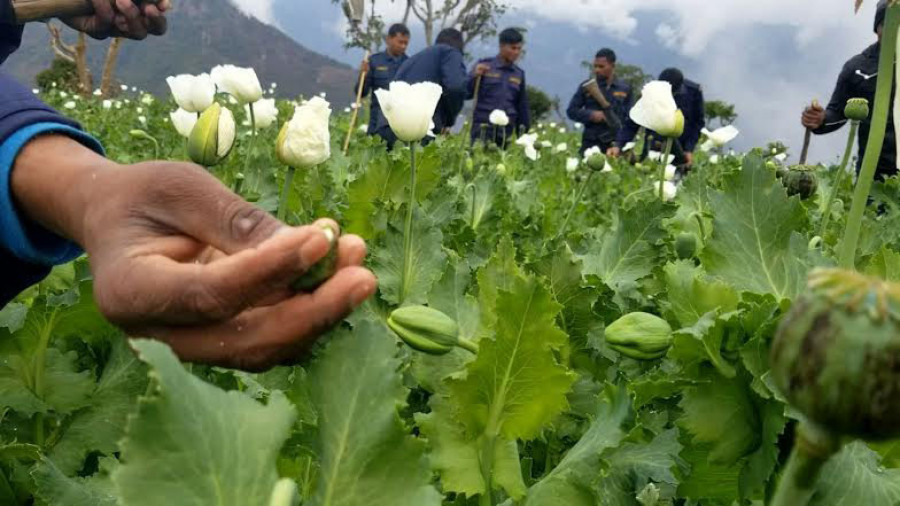National
Aided by Indian drug traffickers, farmers are increasingly turning from marijuana to opium
Once limited to Tarai districts along the border with India, the cultivation of poppy plants has now spread across the hills of Nepal.
Shuvam Dhungana
On January 1, a joint team from the Makwanpur District Police Office and the Narcotics Control Bureau travelled to Raksirang Rural Municipality armed with sickles and petroleum products. They had received a tip-off that Raksirang locals were cultivating poppies for opium production and their aim was to destroy as much of the illegal crop as possible. But when they arrived, they realised that they were faced with a nigh-impossible task.
“We found that almost everyone from Raksirang was cultivating opium and marijuana on hundreds of bighas of land. Almost 90 percent of the rural municipality was growing poppy,” Inspector Sujan Pathak of the Makwanpur District Police told the Post. “It was impossible to destroy all of it in a short period of time.”
The police team only had limited rations for five days and not nearly enough personnel or destructive implements to get rid of all the poppy and marijuana, said Pathak. In the end, they ended up deploying 78 police personnel to destroy poppy plants on 50 bighas of land. No farmers were arrested.
“Most farmers are uneducated and unaware, so they don’t know that growing poppy for opium is illegal,” said Pathak. “They only know that it is a profitable cash crop.”
There was a time when poppy plants were only cultivated in a few districts that bordered India. However, in recent years, poppy cultivation has spread far and wide across the hills of Nepal, according to the Narcotics Control Bureau, the specialised drug enforcement wing of the Nepal Police.
“The cultivation of poppy to make opium is flourishing in districts like Makwanpur, Rautahat, Surkhet, Jajarkot, Doti, Rukum and Rukum West,” said an investigating officer at the Narcotics Control Bureau who spoke on condition of anonymity as he was not authorised to speak to the media.
The poppy flower is used to make hard drugs like opium and heroin. Brown sugar, an adulterated form of heroin that is cut with chalk powder, zinc oxide, and even rat poison, is widely abused in Nepal.
According to data from the narcotics bureau, in the past three years, police have destroyed over 190 kilograms of opium from various districts. This number, however, does not reflect the scale of the poppy plantation. Poppy cultivation tends to take place in remote areas where road access is scarce and locals are often hostile to the police, said the officer. Locals tend to be poorer and the poppies can be a lucrative cash crop.
“It can take days just to reach such remote areas, so without a proper tip-off about illegal plantations on large swathes of land, we generally do not start operations,” said Superintendent Birendra Kumar Bashyal, spokesperson for the bureau. “Due to a lack of observation by security agencies in remote areas, opium cultivation has become widespread.”
This is also causing a lot of problems for the police, as locals are often uncooperative. Police have to travel days to reach remote areas where the poppy is being cultivated carrying their own rations and tents as locals are unwilling to provide them with shelter and food. Entire villages, including elected local representatives, are involved in the cultivation, said Pathak.
Poppy plants can be cultivated around the year, except for the monsoon months of April, May and June. The crop generally takes three months to grow, with one kilogram fetching up to Rs 150,000 in the black market, said Superintendent Sushil Singh Rathour, chief of the Makwanpur District Police.
“Products like opium and marijuana are only supplied from Nepal; they are not refined here,” said Rathour. “Agents take advantage of lax security along the open border and smuggle the raw plants into India for processing.”
According to police, most plantations are being led by Indian drug traffickers, who provide poppy seeds to farmers and teach them how to cultivate the plants. Indian drugs traffickers and their Nepali agents visit the fields themselves and pre-book the land where the drugs are being cultivated, according to police.
“Even if we arrest people during checks, they do not have any idea about the larger trafficking ring and who the higher-ups are,” said Rathour. “They are just ordered to deliver the raw plants to a specific person.”
Marijuana, which used to be the illegal cash crop of choice for many farmers, is slowly being replaced by poppies for opium as they provide a bigger return, said Bashyal.
But with limited means and a hostile population, there is little that the police can do. They need more human resource, a dedicated budget and political will in order to tackle this growing problem, said police officials.
“Arresting entire villages is impossible so we destroy as much as we can and return to our base,” said Pathak. “Although it’s not a permanent solution, there is nothing else we can do.”




 22.12°C Kathmandu
22.12°C Kathmandu













